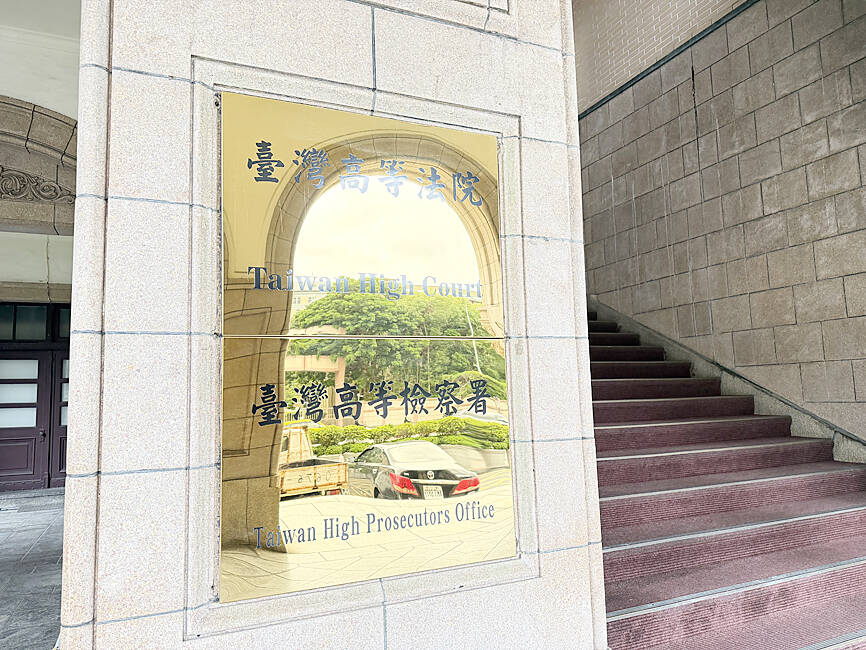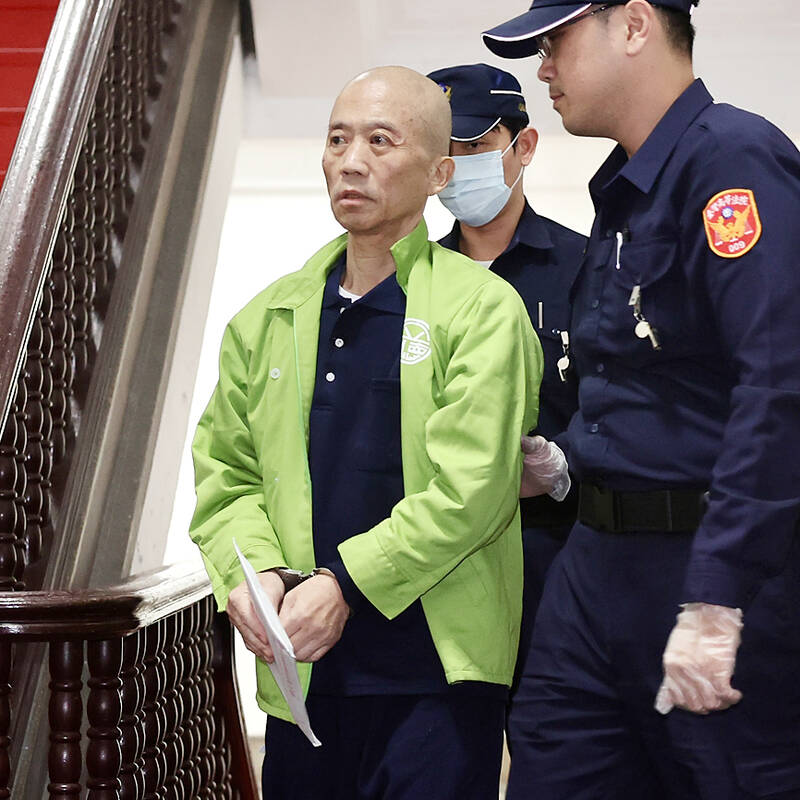The High Prosecutors’ Office yesterday indicted seven people — a man from Hong Kong and six former and active military service members — on charges of spying for China.
Ting Hsiao-hu (丁小琥), a Chinese man who holds Hong Kong residency, entered Taiwan multiple times on business and tourist visas to develop an espionage network, prosecutors said.
Ting recruited retired military officers Wang Wen-hao (王文豪) and Tan Chun-ming (譚俊明), who in turn recruited former colleagues and subordinates to gather classified military information, prosecutors said.

Photo: CNA
A judicial investigation identified four other active and retired military personnel who were allegedly involved in the case, as well as two others who have passed away.
The group was paid based on the value of the intelligence provided, the prosecutors said, adding that members were encouraged to urge active-duty personnel to passively resist or surrender in the event of a cross-strait conflict.
Ting, an operative for the Chinese People’s Liberation Army General Political Department’s Nanjing work station, funneled more than NT$11.12 million (US$356,216) into Taiwan through accomplice Chen Chun-an (陳俊安) using underground money transfers to fund the operation, prosecutors said.

Photo: CNA
Prosecutors on July 24 conducted four raids on 21 locations, summoned 13 people for questioning and investigated 16 people.
The High Prosecutors’ Office indicted Ting and six others on charges of breaching the National Security Act (國家安全法), the Classified National Security Information Protection Act (國家機密保護法) and the Criminal Code of the Armed Forces (陸海空軍刑法).
It is disheartening that the six military personnel betrayed their country by leaking confidential information, posing a severe threat to national security, prosecutors said, urging the court to impose a heavy sentence.
The Taipei District Prosecutors’ Office separately indicted Ting, Chen and Wang on charges of money laundering, while it decided not to prosecute the two deceased suspects.
The Ministry of National Defense yesterday confirmed the arrest of seven suspects for alleged involvement in a Chinese espionage case, including two active-duty officers.
An internal investigation found reason to suspect a military officer surnamed Yang (楊), who was referred to the National Security Bureau, the Ministry of Justice Investigation Bureau and other agencies, it said.
The ministry said it strongly condemned the “treasonous behavior” of personnel who breached their oath of loyalty.
China has been developing organizations in Taiwan and its infiltration efforts have never ceased, it said.
The ministry has fully implemented security vetting mechanisms for personnel handling classified information, set up access-to-secrets certification protocols, deepened counterintelligence training and raised overall security awareness among troops, it said.
It also vowed to continue close cooperation through the national security joint-defense mechanism to safeguard the nation.
Tunghai University Cross-Strait Research Center deputy executive director Hung Pu-chao (洪浦釗) yesterday said the real threat comes from China’s national security system instead of the Hong Kong community itself, as Taiwan and Hong Kong both face pressure from China.
Since China imposed a National Security Law in Hong Kong in 2020, the former British colony has been fully taken over by China’s national security system, he said.
For Hong Kongers in Taiwan, the risk of being pressured, used or coerced to become a spy is not hypothetical, but an almost inevitable consequence of the political reality, he said.
Taipei should continue its unwavering support for Hong Kong’s values, but cannot ease up on efforts to safeguard national security, he said.
The case is not an isolated incident, but a wake-up call that Taiwan must re-evaluate its risk assessment for people from Hong Kong, he said.
“Tighter controls” does not mean blanket restrictions on Hong Kongers, but rather more precise and tiered risk profiling, he said.
Taipei’s position remains clear, which is that the Hong Kong community deserves support, and yet defense efforts against Beijing’s national security penetration must be strengthened simultaneously, he said, adding that the two goals are not contradictory, but equally necessary.
Additional reporting by Chen Yu-fu

Right-wing political scientist Laura Fernandez on Sunday won Costa Rica’s presidential election by a landslide, after promising to crack down on rising violence linked to the cocaine trade. Fernandez’s nearest rival, economist Alvaro Ramos, conceded defeat as results showed the ruling party far exceeding the threshold of 40 percent needed to avoid a runoff. With 94 percent of polling stations counted, the political heir of outgoing Costa Rican President Rodrigo Chaves had captured 48.3 percent of the vote compared with Ramos’ 33.4 percent, the Supreme Electoral Tribunal said. As soon as the first results were announced, members of Fernandez’s Sovereign People’s Party

MORE RESPONSIBILITY: Draftees would be expected to fight alongside professional soldiers, likely requiring the transformation of some training brigades into combat units The armed forces are to start incorporating new conscripts into combined arms brigades this year to enhance combat readiness, the Executive Yuan’s latest policy report said. The new policy would affect Taiwanese men entering the military for their compulsory service, which was extended to one year under reforms by then-president Tsai Ing-wen (蔡英文) in 2022. The conscripts would be trained to operate machine guns, uncrewed aerial vehicles, anti-tank guided missile launchers and Stinger air defense systems, the report said, adding that the basic training would be lengthened to eight weeks. After basic training, conscripts would be sorted into infantry battalions that would take

GROWING AMBITIONS: The scale and tempo of the operations show that the Strait has become the core theater for China to expand its security interests, the report said Chinese military aircraft incursions around Taiwan have surged nearly 15-fold over the past five years, according to a report released yesterday by the Democratic Progressive Party’s (DPP) Department of China Affairs. Sorties in the Taiwan Strait were previously irregular, totaling 380 in 2020, but have since evolved into routine operations, the report showed. “This demonstrates that the Taiwan Strait has become both the starting point and testing ground for Beijing’s expansionist ambitions,” it said. Driven by military expansionism, China is systematically pursuing actions aimed at altering the regional “status quo,” the department said, adding that Taiwan represents the most critical link in China’s

‘REALLY PROUD’: Nvidia would not be possible without Taiwan, Huang said, adding that TSMC would be increasing its capacity by 100 percent Nvidia Corp CEO Jensen Huang (黃仁勳) on Saturday praised and lightly cajoled his major Taiwanese suppliers to produce more to help power strong demand for artificial intelligence (AI), capping a visit to the country of his birth, where he has been mobbed by adoring fans at every step. Speaking at an impromptu press conference in the rain outside a Taipei restaurant, where he had hosted suppliers for a “trillion-dollar dinner,” named after the market capitalization of those firms attending, Huang said this would be another good year for business. “TSMC needs to work very hard this year because I need a lot